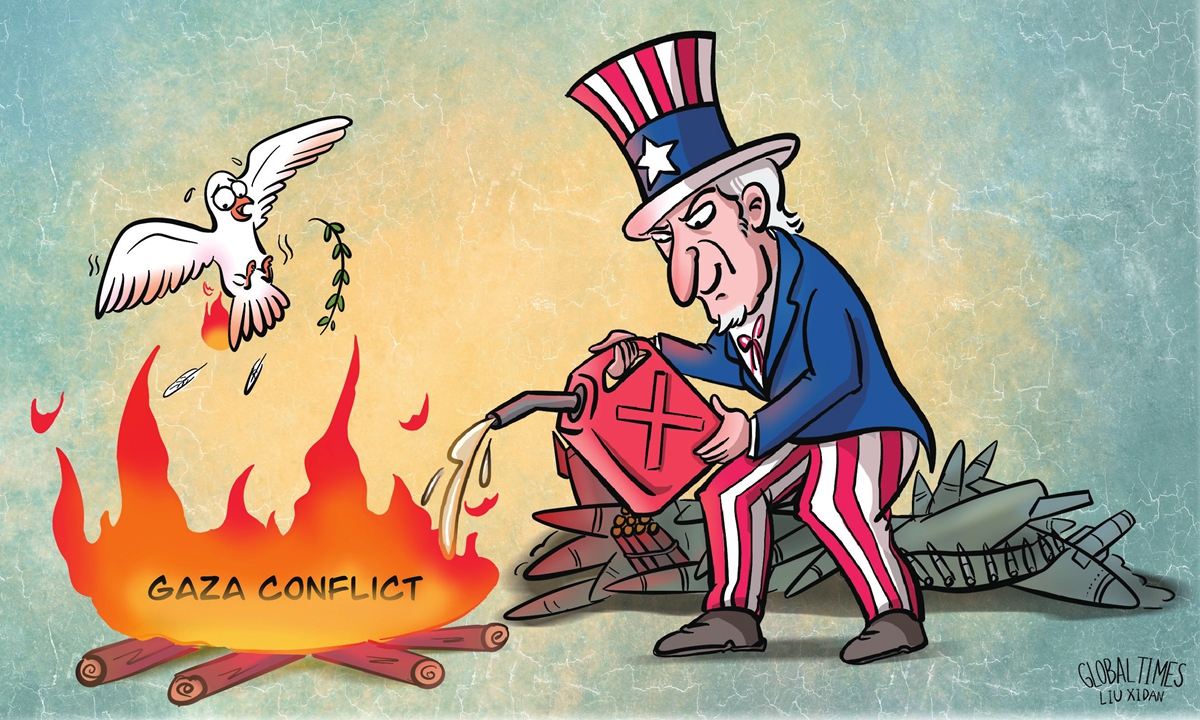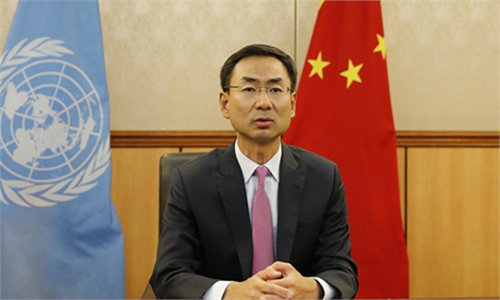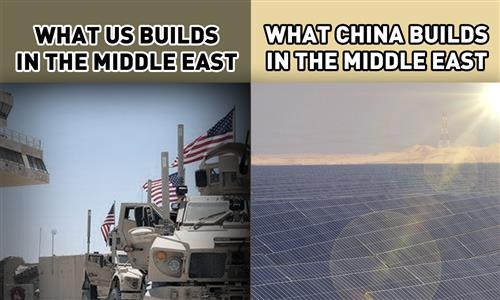
Illustration: Liu Rui/GT
On Friday, a resolution put forward by the United Arab Emirates calling for an immediate humanitarian cease-fire in Gaza failed to pass in a vote at the United Nations Security Council. The US, as a permanent member of the Security Council, used its veto power. This is the second time, after October 18, that the US has been the only opposing vote on such a resolution.
In addition, another decision made by the US has been questioned by the international community: According to the Pentagon on Saturday, the Biden administration used an emergency authority and skipped the congressional review to approve the sale of about 14,000 tank shells to Israel. It can be said that the veto of the US and the provision of armaments to Israel at this critical moment are undoubtedly adding fuel to the fire during the Palestine-Israel conflict.
Currently, the US speaks one way and thinks another. For fear that its strategic layout in the Middle East would be destroyed, the US hopes to limit Israel's military strikes. Meanwhile, it seems that the US is also "actively" exerting diplomatic pressure on the Israeli side to stop its military operations to avoid the escalation of the humanitarian crisis in Gaza.
The US claims it supports peace in the Middle East, but its actions are further fueling the conflict in Gaza. The US has provided Israel with a great deal of assistance since the outbreak of the conflict, including the White House's request to provide Israel with $14 billion in aid for its air and missile defenses.
In fact, the world is not surprised that the US has continuously provided military assistance to Israel. There is a close military cooperation between the US and Israel. The signing of a memorandum of understanding (MoU) between the two countries in 1965 marked the beginning of their strategic relationship. In 1981, a new MoU was signed on strategic cooperation between the two sides. Since the recent outbreak of conflict in Gaza, the US has organized a large-scale supply to Israel, with weapons such as the Iron Dome air-defense system and precision-guided bomb equipment transferred to it.
More importantly, the US is not only shirking its responsibility to promote peace and end the war, but is also evading its obligations in humanitarian assistance and peace talks.
The US veto over a resolution at this critical moment has caused a serious setback to the international community's efforts to promote a cease-fire between Palestine and Israel, leading the situation in the Middle East to an even more volatile and dangerous level.
The resolutions proposed by the Security Council, the most authoritative and influential international platform, can represent the voices of the international community and should exert influence on the realization of a cease-fire between the Palestinian and Israeli sides. 13 of the 15 Security Council members supported the resolution in the vote, while the UK abstained. But the US was the only country that cast a veto, thus making a unanimous resolution impossible, and seriously disrupting the call for fairness and justice by the international community on the Israel-Palestine issue.
Currently, the stability of the Middle East faces new challenges. On one hand, the ongoing Palestine-Israel conflict has exacerbated the humanitarian crisis in Gaza. After the outbreak of the conflict, the displacement of a massive population in a short period of time has not only upset the economic equilibrium, but also paralyzed the relief mechanisms there. Although the international community has organized multiple rounds of aid, the intense fighting has caused great difficulties in maintaining humanitarian assistance.
On the other hand, since the new round of the Israel-Palestine conflict, armed groups in Lebanon, Syria and Iraq have attacked Israel and US targets. The situation in the region has been shrouded in tension and crisis, with protests and demonstrations taking place in Jordan, Egypt and other countries, posing a great risk to the domestic political stability of these countries. As the root cause of the conflict in the Middle East, as long as the Palestine-Israel cease-fire cannot be achieved, the regional countries and the international community will face the risk of continued spillover effects from the conflict.
The author is an associate professor at the Institute of Middle Eastern Studies of Northwest University. opinion@globaltimes.com.cn



